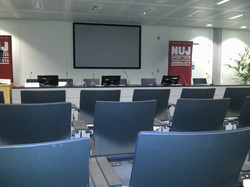
On the 1st of March I attended a colloquium run by the Institute of Historical Research on the subject The Finch Report, open access and the historical community.
The event was split into three panels trying to give the society, publisher and intermediary views from the historical community. It was attended by a range of people from students and researchers to publishing company VPs and there was a lot of lively discussion. Suffice to say I felt a bit out of my depth.
The main issues that came out of the discussion were:
So as you can see there is still a lot of work to be done by governments, funding bodies and the academic community and publishers to make open access work for everyone. It all seems to boil down to the fact that people still don't understand OA completely. There needs to be more communication to rid people of their misconceptions about OA - and that's across the board including those making the policy and those doing the research.
One area that people seemed most confused about was monographs and where they fit in with recent research council mandates. In fact most people were barely thinking about monographs at all and they were definitely marginalised in this journal-heavy discussion. And why not when an academic can get the same REF score for writing two journal articles as they can for spending months, or even years, writing a monograph. But what these academics don't seem to understand is that if no one rallies for monographs we might lose them altogether.
But not to worry, monographs have a champion in the form of Jisc Collectios' OAPEN - UK scheme. This scheme sees a number of monographs from a range of subjects and publishers being made openly available online via the publisher website and Google Books. Caren Milloy from Jisc was there to make the case for monographs and to make sure they weren't left out of the discussion, and of course to plug the upcoming Jisc Open Access Monographs in the Humanities and Social Sciences Conference in July.
So all in all a really good afternoon that raised a lot of issues, and I got a few business cards too.
The event was split into three panels trying to give the society, publisher and intermediary views from the historical community. It was attended by a range of people from students and researchers to publishing company VPs and there was a lot of lively discussion. Suffice to say I felt a bit out of my depth.
The main issues that came out of the discussion were:
- In the humanities and social sciences green open access is preferable but it needs to be sustainable and the embargo periods need to be right (not too short)
- Humanities and social sciences are very different from STM subjects and so there can't be a one size fits all gold OA policy
- There are international concerns, mainly that the UK is going out on a limb by leading the way in OA and this could result in it becoming isolated in the global research environment
- There needs to be a diverse publishing environment and that publishing can't just be left to those big companies that can manage APCs as this may end in a monopoly that kills off smaller publications and publishers
- Licenses are still a thorny issue and people are still not sure what CC licenses cover
So as you can see there is still a lot of work to be done by governments, funding bodies and the academic community and publishers to make open access work for everyone. It all seems to boil down to the fact that people still don't understand OA completely. There needs to be more communication to rid people of their misconceptions about OA - and that's across the board including those making the policy and those doing the research.
One area that people seemed most confused about was monographs and where they fit in with recent research council mandates. In fact most people were barely thinking about monographs at all and they were definitely marginalised in this journal-heavy discussion. And why not when an academic can get the same REF score for writing two journal articles as they can for spending months, or even years, writing a monograph. But what these academics don't seem to understand is that if no one rallies for monographs we might lose them altogether.
But not to worry, monographs have a champion in the form of Jisc Collectios' OAPEN - UK scheme. This scheme sees a number of monographs from a range of subjects and publishers being made openly available online via the publisher website and Google Books. Caren Milloy from Jisc was there to make the case for monographs and to make sure they weren't left out of the discussion, and of course to plug the upcoming Jisc Open Access Monographs in the Humanities and Social Sciences Conference in July.
So all in all a really good afternoon that raised a lot of issues, and I got a few business cards too.


 RSS Feed
RSS Feed